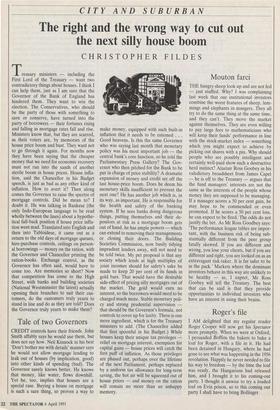Mouton farci
THE hungry sheep look up and are not fed — just stuffed. Why? I was complaining last week that our institutional investors combine the worst features of sheep, lem- mings and elephants in mangers. They all try to do the same thing at the same time, and they can't. They move the market against themselves. They are even willing to pay large fees to mathematicians who will keep their funds' performance in line with the stock-market index — something which you might expect to achieve by picking out shares with a pin. Why should people who are possibly intelligent and certainly well-paid show such a destructive herd instinct? Alastair Ross Goobey in his valedictory broadsheet from James Capel — he is off to the Treasury — argues that the fund managers' interests are not the same as the interests of the people whose money they are supposed to be managing. If a manager scores a 50 per cent gain, he may hope to be commended or even promoted. If he scores a 50 per cent loss, he can expect to be fired. The odds do not justify the bet. As Mr Ross Goodbey says: `The performance league tables are impor- tant, with the business risk of being sub- stantially different from the peer group fatally skewed. If you are different and wrong, you lose your clients, but if you are different and right, you are looked on as an extravagant risk-taker. It is far safer to be in the pack.' Markets where the dominant investors behave in this way are unlikely to be healthy — as, I expect, Mr Ross Goobey will tell the Treasury. The best that can be said is that they provide opportunities to individual investors who have an interest in using their brains.


















































 Previous page
Previous page